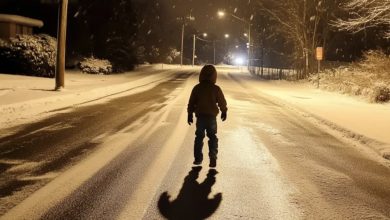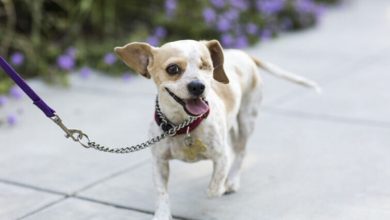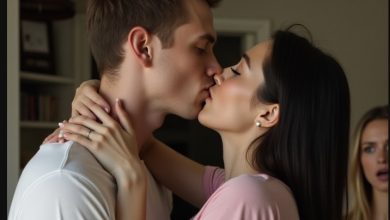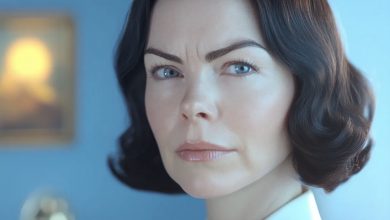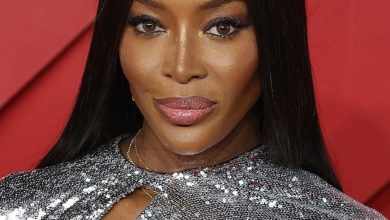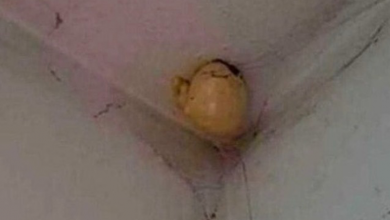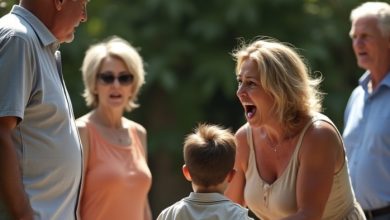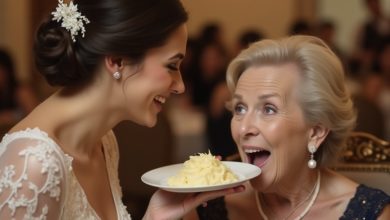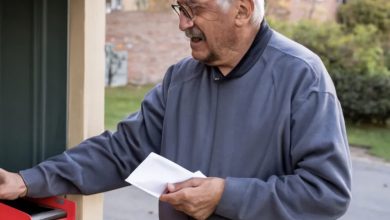One year after he ended our marriage he sat in my crowded restaurant and finally saw the life and family I built without him
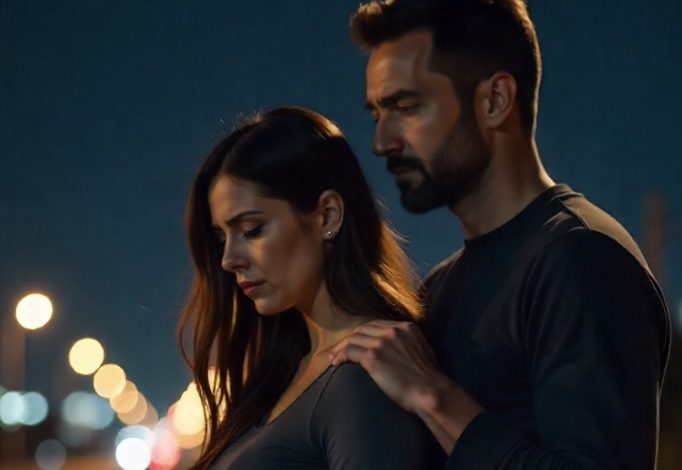
When he ended the marriage, he curled his lip and said, “If you actually loved someone, at least it would make sense.” A year later, in a noisy restaurant packed with people, Ian finally understood what he’d thrown away.
I woke before the sky changed color. The apartment was cool and dim, and the city outside hadn’t started humming yet. I slid out from under the thin blanket, tucked it around my sleeping husband, Ian, and brushed a quick kiss against his stubbled cheek. In the kitchen I started the coffee. That morning routine was my small joy: stand on our tiny balcony, hold a warm mug, and watch the rooftops while the streets were still quiet. In summer, the air felt almost clean. On mornings like that, I would say a quiet thank-you for a life that, to me, felt steady and good.
Ian loved me. I loved him. And very soon we would be parents. We argued playfully about the baby’s sex—he was certain we’d have a girl; I was sure it was a boy. We’d lie in bed and talk about names and futures. I pictured a son who loved the outdoors and ran everywhere on sure feet. Ian imagined a daughter who wore a white coat and saved lives like his late mother had done.
“You know,” he’d say, running a hand through my hair, “when I was little I wanted to be an archaeologist. I made up a dinosaur name for my big discovery—the Ian-o-saurus.”
“And now you operate excavators instead of brushes,” I’d tease. “Much faster than digging with a spoon.”
I smiled at the memory, finished my coffee, and started breakfast. Bacon sizzled; eggs set in the pan. The smell brought Ian out of the bedroom. He slumped onto a stool at the counter, frowning at nothing.
“Wrong side of the bed again?” I asked, keeping my voice light. “You’ve been edgy lately.” I set the plate in front of him and sat down. He tapped his fork against the eggs but didn’t eat.
“Ava,” he said at last, looking past me toward the window. “I can’t keep pretending. I’ve been holding something back for too long, and it’s tearing me up.”
A cold feeling spread through me even though the kitchen was warm. “Holding what back? What are you talking about, Ian?”
He exhaled, slow and steady, as if he’d rehearsed it. “A few months ago,” he said, voice low and even, “I realized I’m in love with someone else.”
The room shrank. I felt like I was breathing through cloth.
“What about us?” I asked, the words dry in my mouth. “What about the baby? Did that slip your mind? We’re about to be parents.”
“I haven’t forgotten,” he said, a sudden edge in his tone. “But I can’t keep torturing myself—or you. Leaving is the right thing.”
“The right thing?” I repeated, tasting bitterness I’d never felt before. “What will you tell our child? What does ‘right’ look like to them when Dad is gone?”
He rubbed the back of his neck and stared at the counter. The silence pressed on my ears until it hurt.
“Things happen,” he finally muttered, reaching to put his arm around me.
I flinched away and stood so fast my chair scraped the tile. My palm flew before I knew it—one sharp slap that cracked through the kitchen.
“I am not you,” I said, shaking. “I will never do what you’re doing.”
I grabbed a jacket and slid my feet into sandals. “Where are you going?” he called from the stool.
I didn’t answer. My hand rested on the knob. A silly, hopeful part of me waited for him to cross the room, to catch me and say it was all a mistake. I would have believed him. I would have let it go.
He didn’t move.
“I’m leaving,” I said. “Goodbye.”
A beat of air.
“Your choice,” he replied.
I stepped out and closed the door on the life I thought I had.
I went to my friend Leah’s house because I didn’t know what else to do. Leah lived inside a swirl of projects and noise—two lively kids, a husband who complained about everything, and a renovation that never seemed to end. I didn’t tell her what had happened. Her world was already too full. She glanced at my face and frowned.
“You look… off. What’s going on?”
“I’m just tired,” I lied, lifting a cold cup of tea to my lips. “Pregnancy, you know.”
“Believe me, I remember,” she said with a half laugh. “At least you have Ian. He’s steady. Not like my couch ornament.”
The word steady cut like a blade. I stood too quickly, mumbled that I had errands, and left before she could ask more questions.
By evening I was walking with no destination. The sky turned a heavy blue. Without really meaning to, I reached a wide concrete overpass that crossed a dark grid of train tracks. Streetlights flicked on one by one. I leaned against the railing and felt smaller than I’d ever felt. A thought came as clearly as if someone had whispered it: No one needs me. My parents were gone. Ian wanted someone else. If I vanished, who would notice?
My hands tightened on the rail. I moved without thinking, placing myself where the drop yawned below. Wind pushed at my hair. I set my palm over my belly. “I’m sorry,” I whispered to the little life inside me, and the wind carried the words away.
I began to lean—
—and strong hands clamped onto my shoulders and stopped me cold. I gasped. The grip steadied me and guided me back to the safe side. A bicycle thumped as it fell. A man’s face came into focus, eyes wide and scared.
“I guess I’m your guardian angel tonight,” he said between breaths, keeping his hands on my arms until my knees stopped shaking. He helped me sit and then dropped beside me, wiping sweat from his forehead.
“Were you really going to do that?” he asked, voice soft. “What about the baby?”
I blinked. “How did you know?”
He gave a sad, crooked smile. “You kept holding your belly. I could see you from down the path.” He paused. “Boyfriend trouble?”
“Husband,” I said.
He nodded, and something in his expression told me he knew that kind of pain. “That’s heavy,” he said quietly. “But ending two lives won’t fix one broken heart.”
“What would you know about it?” I snapped, more from shame than anger.
His smile didn’t fade, but sorrow moved behind it. “More than I wish,” he said. “My wife died last year. She was pregnant. A car came out of nowhere. One second she was here, the next… gone.” He looked out over the tracks. “You think I didn’t stand right where you were and consider the same thing?”
“I’m sorry,” I whispered. “What stopped you?”
“I don’t know,” he admitted. “A voice in my head. A stubborn part of me. Maybe her.” He stood and held out a hand. “Come on. There’s a warm place nearby. You shouldn’t be out in this wind.”
His name was Elias. The warm place was The Dahlia Bistro, a small restaurant glowing like a lantern. Inside, the air smelled of sugar and coffee. I reached for water, ashamed to order anything else. Elias waved the hesitation aside and looked at the waitress.
“Lisa, could we get two coffees, waffles, a scoop of ice cream, and some crepes? Thank you.”
“Right away, Mr. Hayes,” she said with a wink.
“You come here a lot,” I said, surprised to hear my voice sounding normal again.
He peeled off cycling gloves and nodded. “It used to belong to my wife,” he said softly. “Her name was Dahlia. She ran it. I was a truck driver. After the accident, I couldn’t sell it. Keeping it open feels like keeping a piece of her in the world.”
He talked about Dahlia with a love that made my throat ache. The plates arrived—warm, sweet, simple food that tasted like comfort. He pushed a fork toward me. “My mom always swore dessert is the best medicine for sadness,” he said. “Try.”
I ate. For the first time that day, I tasted something besides salt and fear. We talked. Elias listened with his whole face, patient and kind. He told me stories of hauling cargo through storms, of fixing things that broke, of learning to hold grief without letting it swallow him. By the time I stood to leave, I could breathe again.
At the door I fished crumpled bills from my pocket—my last cash—and set them on the table. Elias followed me outside.
“Where are you going?” he asked.
I looked down the wet sidewalk. “I don’t know,” I admitted.
“I thought so.” He ducked back inside and returned with a small ring of keys and a folded paper. “These are for my grandfather’s old apartment. It’s empty but safe. The address and my number are here. I called a cab. You can rest there tonight.”
“Aren’t you worried?” I asked, stunned. “I could take the keys and disappear.”
He laughed, warm and easy. “There’s nothing in there worth stealing. And tomorrow I’ll come by and make sure you didn’t run off with the wallpaper.”
I let out a sound that was almost a laugh. “Thank you,” I said, meaning it with my whole heart.
A week later I went back to our apartment during the day to collect my things. Ian stood at the ironing board in a new shirt and a better mood. He barely looked at me.
“Do you need money?” he asked flatly.
“I’ll manage.”
“Doing what?” He snorted. “When’s the last time you worked, anyway?”
I didn’t answer. I zipped the bag and walked out. The door clicked shut behind me.
Time moved forward. I carried my pregnancy to term and had a beautiful baby girl. I named her Lily, after my mother. Elias and I spent time together because it felt natural to. His steady kindness made room for me to heal. We fell in love slowly, in small ways: rides to doctor visits, help with groceries, shared laughs over spilled coffee. When Lily was five months old, he asked if he could be at her checkups. When she was a year old, he asked me to marry him.
We had a simple ceremony with a few friends from the bistro and some of my coworkers from the hospital. Elias renamed the restaurant Ava’s Place as a wedding gift, but he kept a small portrait of Dahlia near the register with fresh flowers. “She’d like you,” he told me once, and I believed him. I started working at the bistro, not as a manager but as a waitress by choice. I liked the rhythm of it—orders called out, plates balanced in both hands, smiles traded with regulars. After what I’d been through, it felt good to stand on my own two feet and earn honest tips.
Our life wasn’t fancy, but it was full of warmth. Lily learned to toddle around the back room; staff took turns entertaining her. Elias read stories with all the voices. Some nights I would look across the dining room and see him laughing with a customer, and my chest would fill with something strong and sure. This is what love looks like, I would think. Quiet, steady, joyful.
One stormy Saturday, the door swung open and a couple hurried in, wet from the rain. The man shook droplets from his jacket and glanced up at the sign over the counter.
“Ava’s Place,” he said to the woman beside him, half laughing. “Same name as my ex.”
I looked up from the service station, and the world slowed. Ian. His hair a little thinner, his smile a little forced. The woman with him—his wife, I guessed—looked tired in a way I recognized.
I picked up my notepad and walked to their table. “Welcome to Ava’s,” I said with a polite smile. “What can I bring you tonight?”
Ian looked up. His jaw went slack. All color left his face. “Ava?” he breathed.
“Hello, Ian,” I said, calm as still water.
“You… work here?” He glanced at the apron around my waist, then at the full room. “As a waitress?”
“I like it,” I said simply. “It’s good work.”
“Who is that?” the woman asked, annoyance sharpening her voice.
“My ex,” he muttered, still staring.
I took their order and stepped away. The room felt alive around me—clatter, laughter, soft music. At that moment the front door banged open and Elias came in from the rain, grinning like a man who’d won the lottery.
“Ava!” he called, not caring that the place was busy. “Guess what? It happened—Lily just called me Dad. She ran right into my arms and said it!”
People at the counter cheered. He scooped me up and spun me once, then kissed me quick and happy. He turned, beaming, to the nearest guests—who happened to be Ian and his wife.
“Welcome!” Elias said, reaching to shake Ian’s hand with friendly energy. “Tonight dinner is on the house for you two. We’re celebrating good news.”
Ian’s mouth opened and closed. A piece of potato went down wrong. He coughed, eyes watering, then pushed back his chair.
“I’m going for a smoke,” he rasped, and hurried toward the door.
His wife watched me as if measuring something invisible. “So,” she said to him in a low voice I still overheard, “that’s the woman you left.”
He didn’t answer. He stared through the glass at the rain.
Elias wrapped an arm around my shoulders. I leaned into him, feeling the simple fact of his presence—solid, warm, certain. I glanced after Ian and felt… nothing sharp. No anger. No satisfaction. Only the kind of peace that comes when a wound has finally healed.
A few minutes later, I carried two steaming plates to Ian’s table. He had returned, quiet now. I set the dishes down gently.
“Enjoy,” I said.
He lifted his eyes to mine. For the briefest moment I saw understanding move across his face—like a shadow crossing water. He had told me once that if I truly loved anyone, at least it would make sense. A year later, here in this crowded room, he finally saw the truth: I had chosen love. Not the kind he mocked—messy and selfish—but the kind that saves. Love that steadies you on a bridge. Love that shows up with keys and a safe place. Love that kneels to tie a toddler’s shoe and still makes time to cheer when she says a new word.
He bowed his head. The woman beside him reached for her fork, her jaw tight.
I walked back to the counter, where Elias was telling the story again to Lisa and the regulars, laughing and wiping his eyes because he couldn’t help it. Behind him, Lily peeked out from the kitchen swinging door, her curls stuck to her forehead, her cheeks pink from running. “Mama!” she squealed, reaching.
I lifted the counter flap and scooped her up. “Hey, sunshine,” I said. She pressed a sticky kiss to my cheek and then reached for Elias. “Dad,” she said with delight, and the whole room applauded.
I met Ian’s gaze one last time across the tables. He looked small inside his nice jacket. For the first time, I understood that his sneer the day he left—If you cared for someone, at least it would make sense—had been a confession. He hadn’t understood care at all. Not then. Maybe not even now.
I turned away. Our staff called out orders. The coffee machine hissed. Outside, the rain slowed. Inside, my family—my family—filled the room with warmth.
The life I thought ended on that overpass had not ended at all. It had opened. And in the noise and light of our little restaurant, the truth sat with perfect clarity: love had found me anyway, and I had chosen it back.

